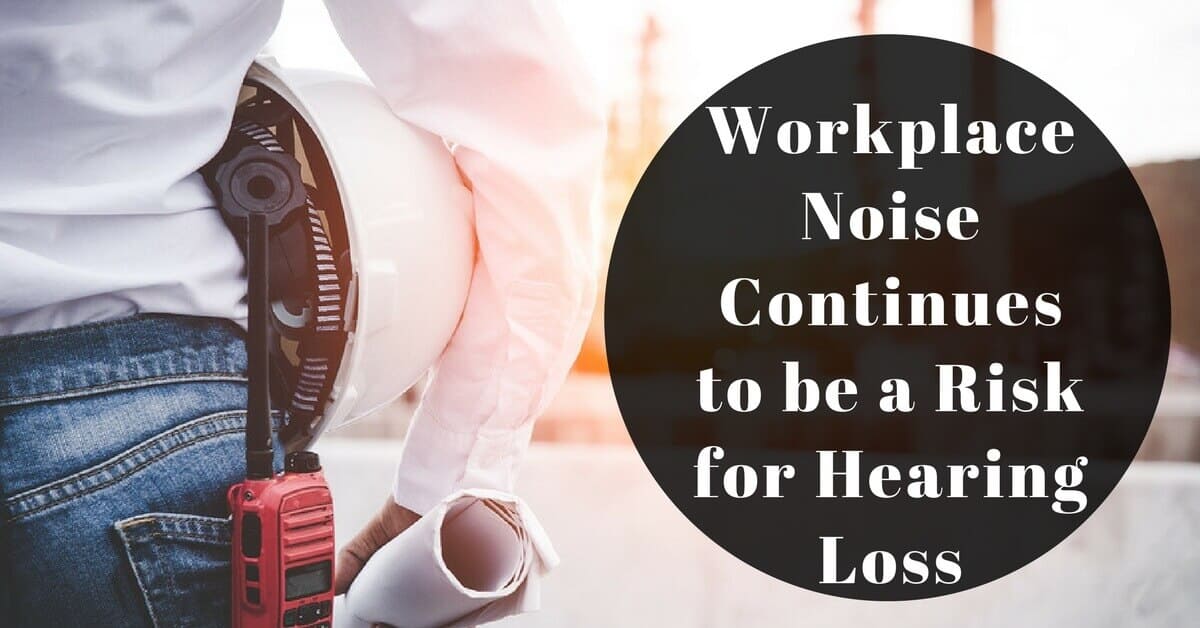
Do you know what is the most common workplace injury? It’s not falls, muscle strains, or accidents. It’s hearing loss! According to the National Institute for Occupational Safety and Health, 22 million Americans are exposed to damaging levels of noise at work, and risk debilitating hearing loss.
Straining to hear is no walk in the park, and we know that struggling to communicate can be stressful and frustrating for everyone involved. You have difficulty hearing high pitched sounds, can’t hear the grandkids playing the yard, and have given up talking on the phone. Not only that, but hearing loss has begun effecting your performance at work as well, and you’ve had a some near accidents in the last few months. Hearing loss is even harming your relationship with your colleagues and your boss. What can be done about workplace noise?
Workplace Noise
You might think that hearing loss only affects seniors, but the reality is far different. The National Institutes of Health estimate that up to 15% of adults under the age of 65 are living with mild, moderate, or severe hearing loss that is affecting their everyday lives. Working in a noisy environment puts you at risk, and you may develop Noise Induced Hearing Loss (NIHL), the result of over-exposure to dangerously loud sounds. Working every day in noisy sectors like construction, farming, manufacturing, or anywhere that uses large machinery, power tools, or heavy equipment could be jeopardizing your hearing health.
How Loud is Too Loud?
Sound is measured in decibel (dB) levels that tell you how loud is too loud when it comes to your ears. Anything over 85 dB can damage your hearing if you’re exposed for a long time. To put that into context, normal conversation is about 60 dB, and the sound of average city traffic is around 85 dB. A tractor might be anywhere from 100 to 110 dB, a rock concert or ball game could reach 120 dB, and the sound of a gunshot in close range measures in at 140 dB.
If you’re exposed to loud noises for a short period of time and they’re not too loud, you won’t experience hearing loss, but the longer you’re exposed and the louder the sound is, the sooner you’ll damage your hearing. You can hear sounds around 85 dB for a few hours without experiencing hearing loss, but even a few seconds of sound at 140 dB will do permanent damage to your hearing.
Protecting Your Hearing
The Centers for Disease Control reports that hearing loss is the most commonly reported workplace injury, affecting millions of Americans and their families. Hearing loss accounts for one of the biggest claims of workers’ compensation, costing around $242 million each year! Noise Induced Hearing Loss is completely preventable, so don’t let hearing loss affect your life.
Most employers in loud industries are required to provide protective hearing gear. If yours doesn’t, talk to your employers. Do the right thing for your hearing health, and always wear hearing protection! Once you’ve damaged your hearing there’s no going back, so don’t take that risk. Not only will you be damaging your hearing, you’ll also increase your risk of workplace accidents or injury since you’ll have lower situational awareness, and might miss important warning sounds like sirens or signals.
The best way to protect your hearing is by wearing ear protection. Earmuffs are one of the most effective ways to protect your hearing, and foam earplugs will also do the trick. Either way, make sure you have your ears covered before starting up the heavy equipment, or entering noisy areas.
Treating Hearing Loss
If you’re struggling with Noise Induced Hearing Loss due to workplace noise, take control of your hearing health today. Call us at My Hearing Centers to book a hearing test, and make the first move towards better hearing.
We have a wide range of hearing devices from many of the world’s finest manufacturers, so whatever your degree of hearing loss, we have the hearing aids that will fill in the gaps in your hearing, work with your ears to give you the best sound, and get you back to hearing all the sounds you’ve been missing. Visit us for more tips on how to safety navigate noisy jobsites, and to find out more about custom hearing protection that will protect your hearing in style.
